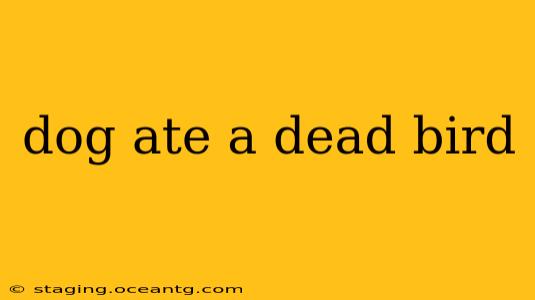Finding your dog with a dead bird in their mouth is undoubtedly alarming. While it might seem like a minor incident, ingesting a dead bird presents several potential health risks for your canine companion. This guide will address your immediate concerns and provide essential information on how to proceed.
What are the risks of a dog eating a dead bird?
This is a crucial question, and the answer depends on several factors. The primary concern is bacterial infection. Dead birds can harbor various bacteria, including Salmonella, E. coli, and Listeria, which can cause severe illness in dogs. Furthermore, the bird may have been carrying parasites or viruses, which can also be transmitted to your dog. The condition of the bird itself is important; a decomposed bird presents a significantly higher risk of infection than a recently deceased one. Finally, the amount consumed matters; a small piece is less concerning than the ingestion of a whole bird.
My dog just ate a dead bird – what should I do immediately?
Your immediate actions are critical. First, remain calm; panicking won't help your dog. Then, carefully observe your dog. Watch for any signs of illness, such as vomiting, diarrhea, lethargy, loss of appetite, or changes in behavior. Note the time the bird was consumed. This information will be vital if you need to seek veterinary attention. Do not induce vomiting unless specifically instructed by your veterinarian. Some substances found in dead birds can cause further complications if forced up.
What are the symptoms of poisoning or infection after a dog eats a dead bird?
Symptoms can vary greatly depending on the bacteria or parasites involved and the bird's condition. Common signs include:
- Gastrointestinal upset: Vomiting, diarrhea (possibly bloody), abdominal pain.
- Lethargy and weakness: Your dog may seem less energetic than usual.
- Loss of appetite: Refusal to eat or drink.
- Fever: Check your dog's temperature using a rectal thermometer; a fever is a significant warning sign.
- Neurological signs: In severe cases, you might observe tremors, seizures, or unusual behavior.
Should I take my dog to the vet if they ate a dead bird?
It's best to err on the side of caution. While your dog may show no immediate symptoms, the incubation period for many bacterial infections can be several days. Contact your veterinarian immediately to discuss the situation. They can assess the risk based on the specific circumstances and advise you on the best course of action. They may recommend observation at home, supportive care, or more extensive testing and treatment.
How can I prevent my dog from eating dead birds in the future?
Prevention is key. Here are some strategies:
- Supervise your dog: Keep a close eye on your dog, especially during walks, especially in areas where birds might be found.
- Positive reinforcement training: Teach your dog a reliable "leave it" command.
- Secure your yard: Fence your yard to prevent your dog from accessing areas where dead birds might be present.
- Clean up promptly: If you discover a dead bird in your yard, remove it immediately.
This information is for general knowledge and should not be considered veterinary advice. Always consult with your veterinarian for any health concerns related to your pet. Remember, proactive monitoring and prompt veterinary intervention are essential to ensuring your dog's well-being.
